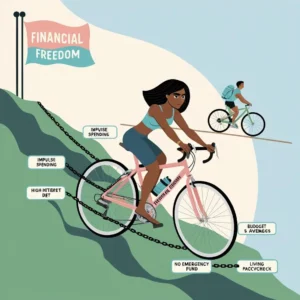Financial independence means having enough wealth and passive income to cover your living expenses without relying on a traditional job. It allows for greater freedom, flexibility, and security in life. However, many people make financial independence mistakes that delay or derail their progress. Avoiding these common financial mistakes can make a significant difference in achieving long-term financial security.
Common Financial Mistakes That Hinder Independence
Overspending and Lifestyle Inflation
One of the biggest money management mistakes is increasing spending as income rises. This phenomenon, known as lifestyle inflation, can prevent wealth accumulation.
The dangers of lifestyle inflation:
- Higher expenses mean less money available for saving and investing.
- It creates financial dependency on a high salary, making it harder to step away from work.
- It can lead to unnecessary debt if spending outpaces income growth.
How to control spending while growing wealth:
- Set a budget and track expenses to ensure savings remain a priority.
- Increase savings and investments proportionally with income growth.
- Avoid upgrading to a more expensive lifestyle unnecessarily.

Not Having an Emergency Fund
An emergency fund is essential for financial security, yet many people overlook it. Without one, unexpected expenses can lead to debt and financial setbacks.
Why an emergency fund is crucial:
- It prevents reliance on credit cards or loans for unexpected costs.
- It provides a financial cushion during job loss or medical emergencies.
- It reduces stress by ensuring financial preparedness.
Recommended savings guidelines:
- Aim for three to six months’ worth of living expenses.
- Keep funds in a high-yield savings account for easy access.
- Adjust the fund size based on job stability and financial responsibilities.
Relying Too Much on Credit and Debt
Debt can quickly become a financial burden if not managed wisely. Many people fall into the trap of excessive credit card use, loans, and other forms of debt without realizing the long-term consequences.
The hidden costs of debt:
- High interest rates can make it difficult to repay balances.
- Fees and penalties add up, making debt even more expensive.
- Stress and anxiety over debt can impact overall well-being.
Strategies to manage and reduce debt:
- Prioritize paying off high-interest debt first.
- Use the snowball or avalanche method for debt repayment.
- Avoid taking on unnecessary debt and live within your means.
Financial Planning Errors That Derail Your Goals
Lack of a Clear Financial Plan
Without a well-defined financial plan, it’s easy to make impulsive decisions that don’t align with long-term goals.
Importance of setting financial goals:
- Provides a roadmap for saving, investing, and spending.
- Helps track progress and stay motivated.
- Reduces the risk of financial missteps.
Steps to create a realistic financial plan:
- Set short-term, mid-term, and long-term financial goals.
- Develop a budget that prioritizes savings and investments.
- Regularly review and adjust the plan as circumstances change.

Ignoring Inflation and Cost-of-Living Increases
Inflation gradually reduces the purchasing power of money, making it essential to factor it into financial planning.
How inflation erodes purchasing power:
- The cost of goods and services rises over time.
- Savings in low-interest accounts lose value.
- Fixed incomes, such as pensions, may not keep up with inflation.
Ways to plan for inflation:
- Invest in assets that historically outpace inflation, such as stocks and real estate.
- Choose inflation-protected securities like Treasury Inflation-Protected Securities (TIPS).
- Increase savings contributions over time to account for rising costs.
Poor Investment Decisions
Investing is key to building wealth, but making poor choices can lead to significant losses.
Common investing mistakes:
- Trying to time the market instead of staying invested long-term.
- Lack of diversification, leading to unnecessary risk.
- Emotional decision-making, such as panic-selling during downturns.
How to develop a long-term investment mindset:
- Focus on consistent investing rather than short-term gains.
- Diversify across asset classes to minimize risk.
- Rebalance the portfolio periodically to align with financial goals.
Retirement Planning Pitfalls to Watch Out For
Delaying Retirement Savings
Many people put off saving for retirement, thinking they have plenty of time. However, starting early provides a significant advantage.
The impact of compounding interest:
- Small contributions grow exponentially over time.
- Delaying savings means missing out on years of potential growth.
- Waiting too long may require much larger contributions later.
How to start saving at any stage:
- Take advantage of employer-sponsored retirement plans like 401(k)s.
- Contribute to IRAs and take advantage of tax benefits.
- Increase contributions whenever possible, even if starting late.
Underestimating Future Healthcare Costs

Healthcare is one of the biggest expenses in retirement, yet many people fail to plan for it adequately.
Rising medical expenses in retirement:
- Increased likelihood of needing long-term care.
- Medicare doesn’t cover all healthcare costs.
- Prescription drug costs and medical procedures can be expensive.
Planning for healthcare expenses:
- Contribute to a Health Savings Account (HSA) if eligible.
- Consider long-term care insurance to protect against high costs.
- Factor healthcare costs into retirement savings goals.
Not Diversifying Retirement Income Streams
Relying solely on Social Security or a pension can be risky, as these income sources may not be sufficient or guaranteed.
The risks of limited income sources:
- Social Security benefits may not cover all living expenses.
- Pension plans can be subject to changes or reductions.
- Lack of diversification increases financial vulnerability.
Alternative income sources for retirement:
- Rental properties for passive income.
- Annuities to provide steady income streams.
- Investments in dividend-paying stocks or other assets.
Avoiding these financial independence mistakes can help secure a stable and prosperous future. By planning ahead, managing expenses wisely, and making informed investment decisions, financial independence becomes an achievable goal.
Money Management Mistakes That Slow Your Progress
Not Tracking Expenses and Budgeting
Budgeting is a fundamental tool for financial independence, yet many people overlook it. Without a budget, it’s easy to overspend and lose track of where your money goes.
The role of budgeting in financial independence:
- Helps allocate money effectively toward savings and investments.
- Prevents unnecessary expenses that can slow wealth accumulation.
- Provides clarity on financial priorities and long-term goals.
Tools and techniques for effective expense tracking:
- Budgeting apps (e.g., Mint, YNAB, Personal Capital) automate tracking and analysis.
- The 50/30/20 rule allocates 50% of income to needs, 30% to wants, and 20% to savings.
- Spending journals or spreadsheets can provide a detailed breakdown of expenses.
Neglecting Tax-Efficient Investment Strategies
Taxes can eat into investment returns if not managed wisely. Using tax-efficient investment strategies can help maximize wealth over time.
The benefits of tax-advantaged accounts:
- 401(k) & Traditional IRA: Contributions are tax-deductible, reducing taxable income.
- Roth IRA: Withdrawals in retirement are tax-free, offering long-term benefits.
- Health Savings Accounts (HSAs): Triple tax advantage (tax-free contributions, growth, and withdrawals for medical expenses).
Tax-efficient investing strategies:
- Use tax-advantaged accounts first before investing in taxable accounts.
- Hold long-term investments to benefit from lower capital gains tax rates.
- Place high-growth investments in Roth accounts and income-generating assets in tax-deferred accounts.

Failing to Adjust Financial Strategies Over Time
Financial goals and circumstances evolve, requiring periodic adjustments to ensure continued progress toward financial independence.
How financial goals change over the years:
- Early career: Focus on debt repayment and building savings.
- Mid-career: Maximize retirement contributions and diversify investments.
- Pre-retirement: Shift toward lower-risk investments and income planning.
The importance of periodic financial checkups:
- Helps reassess goals based on life changes (marriage, children, job shifts).
- Identifies opportunities to optimize investments and tax strategies.
- Ensures alignment with long-term financial independence plans.
How to Avoid These Mistakes and Stay on Track
Building Strong Financial Habits
Developing consistent financial habits can make a significant difference in achieving and maintaining financial independence.
Key daily and monthly habits for financial success:
- Track expenses daily to stay aware of spending patterns.
- Automate savings and investments to ensure consistency.
- Review budgets monthly and adjust as needed.
- Continuously educate yourself on personal finance topics.
Seeking Professional Financial Advice When Needed
While managing finances independently is possible, seeking professional advice can provide valuable insights, especially for complex financial decisions.
When to consult a financial advisor:
- When creating a long-term financial or retirement plan.
- Before making major investment or tax-related decisions.
- During life transitions (marriage, inheritance, career change).
How to choose the right financial expert:

- Look for fiduciary financial advisors who prioritize your best interests.
- Check for certifications such as CFP (Certified Financial Planner).
- Choose someone who aligns with your financial goals and needs.
Regularly Reviewing and Adjusting Financial Plans
Financial plans should not be static. Regular reviews ensure they remain relevant and effective.
Importance of reassessing financial goals:
- Life changes impact financial priorities and risk tolerance.
- Market conditions and inflation require periodic strategy adjustments.
- Ensures that savings, investments, and retirement plans remain on track.
Steps to update investment and savings strategies:
- Review net worth and asset allocation annually.
- Adjust savings contributions based on income and expenses.
- Rebalance investments to maintain a diversified portfolio.
- Optimize tax strategies to minimize liabilities.
Conclusion
Achieving financial independence requires discipline, planning, and the ability to avoid common financial mistakes. By tracking expenses, using tax-efficient investment strategies, and adjusting financial plans over time, you can stay on the right path. Building strong financial habits and seeking expert advice when needed can further enhance your progress. Stay consistent and proactive, and financial independence will become a reality.

